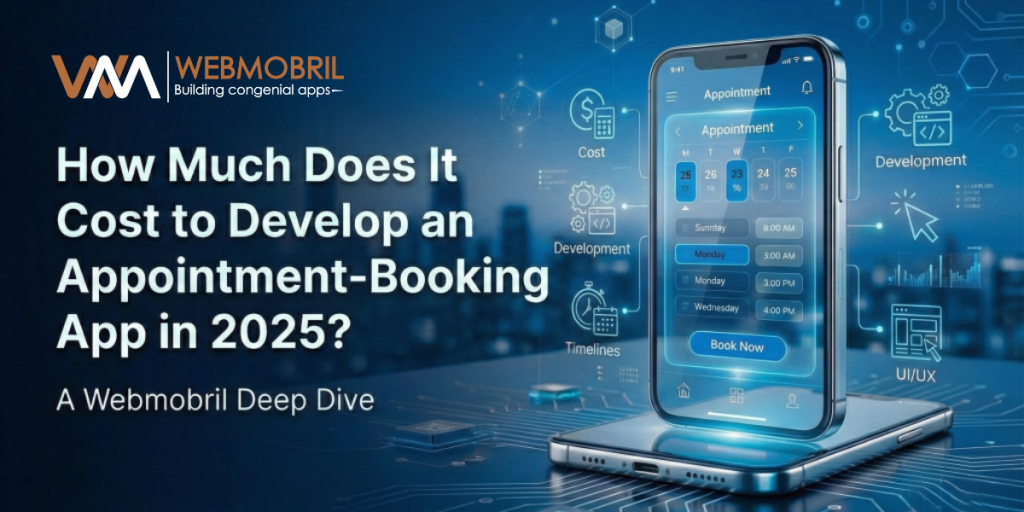In today’s fast-moving digital ecosystem, booking apps are no longer optional—they’re essential. Whether you run a dental clinic, a fitness studio, a consulting practice, or a service-based enterprise, your customers expect the ability to schedule with ease, on any device, at any time.
At Webmobril Inc., we’ve guided hundreds of brands through full-stack digital transformation. In this article we’ll break down what it takes to build an appointment-booking app in 2025—from cost drivers and timelines to key features and strategic considerations—and how you can approach this with confidence.
What Is an Appointment-Booking App?
An appointment-booking app is a digital platform that allows service providers and their customers to schedule, manage, and track appointments effortlessly. It typically includes features such as available slot display, user registration, calendar sync, notifications, and payments.
These systems reduce manual workload, eliminate double-bookings, and deliver a smoother experience for both providers and clients.
Approximate Cost Ranges: What You Should Expect
From our experience at Webmobril, as well as marketplace benchmarks, here’s a realistic ballpark for building an appointment-booking app:
- Basic version (core functionality, single platform, minimal design customisation): ~ USD $10,000–20,000
This aligns with published estimates from other agencies. - Mid-/Advanced version (multi-platform, richer UI/UX, payment integration, calendar & CRM connect): ~ USD $20,000–50,000+
This matches the wider market spectrum. - Enterprise-level/cross-platform (full branding, multiple integrations, analytics, AI-enabled scheduling, service-provider portal): cost can exceed USD $50,000 depending on complexity and scale.
Keep in mind: the final number depends heavily on choices you make—platform, design, integrations, support, scalability.
Key Cost Drivers to Focus On
- Features & Functionality
The more features you pack in, the higher the budget. Basic features include: slot booking, user registration, notifications, simple calendar view. Advanced features might be: payment gateway, wait-lists, provider dashboards, analytics, geolocation, multi-language, branding customisations.
- Platform & Design Complexity
Single platform (iOS or Android) costs less than dual-platform or cross-platform. A heavily custom UI/UX adds time; use of standard UI kits reduces cost. Also consider responsive web + mobile app scenario.
- Integrations & Backend Infrastructure
If your app must integrate with external systems (CRM, calendar services like Google/Outlook, payment gateways, messaging services), cost increases. Backend (database, server, APIs), security, scalability—all add to time and cost.
- Time to Market & Team Location
Rushing the project can increase cost (overtime, expedited QA). Developer rates vary by region; offshore/outsource vs local team make a difference in hourly cost and quality. Also maintenance & support after launch matter.
Typical Timeline
From our Webmobril experience:
- Basic MVP version: ~ 2-4 months
- Mid-complexity version: ~ 4-8 months
- Enterprise / multi-platform / multi-region: 8-12 months+
These timelines include design, development, QA, launch. Delays often come from scope creep, integration issues, or insufficient planning.
Growth Strategy: Beyond Launch
So you launched the app—what next? To turn it into a powerhouse:
- Prioritise user acquisition: SEO, app-store optimisation, digital marketing, partnerships
- Prioritise retention: push notifications, loyalty programmes, feedback loops, continuous feature updates
- Stay ahead: keep refining UX, add intelligent scheduling (e.g., AI-based reminders, predictive slot suggestions), support multi-device and global regions if growth allows.
Risks & Challenges You Should Be Ready For
Developing a booking app isn’t without its pitfalls:
- Saturated market: Many tools already exist; you’ll need differentiation
- Integration complexity: Syncing calendars, payments and CRMs can become tricky
- Scalability/maintenance: Launching is one thing; supporting growing user-base is another
- UX expectations: Users expect slick, seamless experiences. Poor usability = churn
- Regulation/data privacy: If you manage personal data (especially in sectors like healthcare) you must comply.
Why Choose Webmobril Inc. for Your Booking App Project?
At Webmobril, we bring a rare blend of strategy, design, development and marketing under one roof. Here’s why you’ll want to partner with us:
- Full-stack delivery: mobile + web + backend + marketing
- Proven track record: enterprise and startup clients alike
- Agile, milestone-based execution (we structure budgets, timelines and risk transparently)
- Post-launch support and growth-oriented mindset—not just build-and-walk-away
If you’re serious about transforming your scheduling operations and stepping into 2025 with a competitive edge, we’re the team you want.
In Summary: What You Should Do Next
If you’re planning an appointment-booking app:
- Document your must-have features and target platforms
- Decide your budget range (basic vs advanced)
- Choose your development model (single platform vs dual vs web + mobile)
- Build a “phase 1 MVP” with the core functionality, then plan for later enhancements
- Choose a partner who can deliver end-to-end (not just code)
- Plan for growth, retention, and support from day one
Ready to move forward? At Webmobril we’d be happy to schedule a free consultation. Let’s explore your scheduling-app idea, map out your budget, timeline and go-to-market plan. Your vision deserves execution with precision—and that’s where we step in.
🔗 Contact us at: contact@webmobril.com
🔗 Visit: https://webmobril.com
Here’s to building scheduling-systems that work as hard as you do.



